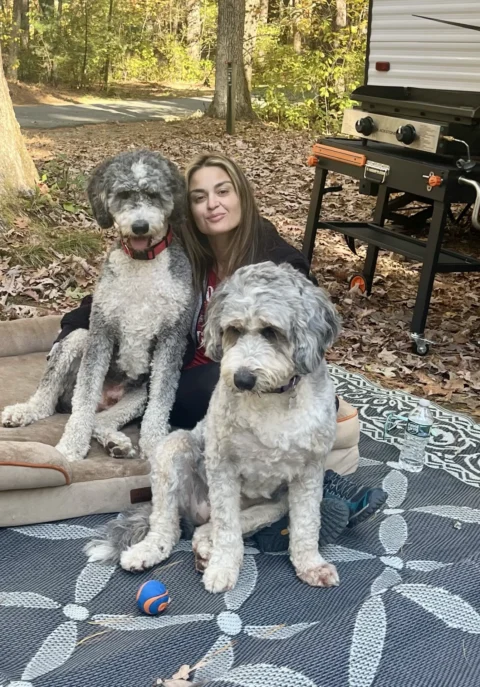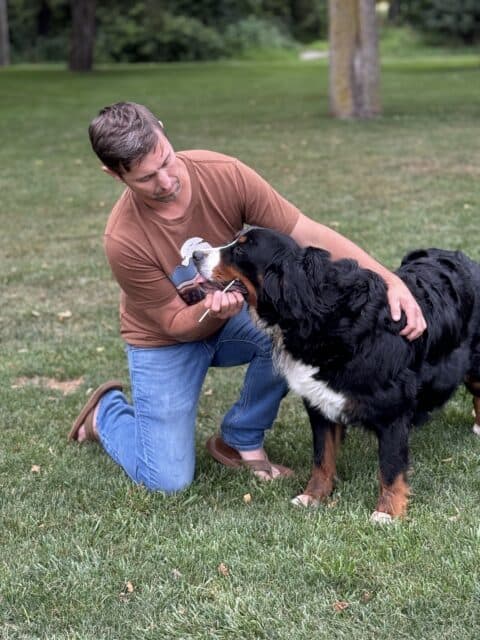As one of the most lovable dog breeds on the planet, Bernedoodles have a special place in the hearts of their owners. As such, most people want to know how long they can expect to have their Bernie’s around.
In the same way that not all people live the same amount of time, Bernedoodles have a wide lifespan range. How long they live depends on a number of factors, including genetics, size, diet, and more.
On average, however, you can expect your Bernedoodle to live between 12 and 18 years.
If you’re curious about the different factors that affect how long a Bernedoodle will live, you’ve come to the right place.
This article will break down the different factors affecting lifespan and why they matter. We’ll also go over some of the things you can do to ensure your Bernie lives as long and happily as possible!
Average Bernedoodle lifespan

As we said before, the average lifespan of a Bernedoodle is 12 to 18 years, depending on several factors, including:
Size
The size of your Bernedoodle is perhaps the biggest factor that affects its lifespan. As with other dogs, smaller doodles tend to live longer than large ones. This is because they have less strain on their bodies and are prone to fewer health problems than larger dogs.
With that in mind, here’s a breakdown of the average Bernedoodle lifespan according to size:
- Micro-mini: 16-18 years
- Mini: 14-17 years
- Medium: 13-16 years
- Large or standard: 12-15 years
Genetics
Genetics also play a role in how long your Bernedoodle may live. A puppy whose parents are both healthy and don’t have any health problems will likely live longer than one who isn’t so fortunate.
While you can’t always guarantee a perfectly healthy dog, genetic testing is a great way to ensure your pup is less prone to health problems than others.
Diet
It’s crucial to give your dog healthy dog food if you want them to live a long and healthy life.
Just as you will have health problems if you eat fast food all day, every day, your dog will have issues if you give them low-quality dog food.
Exercise

Along with diet, it’s imperative that your dog gets plenty of exercise. Regular walks and trips to the dog park will keep your Bernedoodle fit, happy, and healthy.
Additionally, Bernedoodles are very social and active animals, so exercise is good for their mental health, too.
Environment

Although a healthy and happy environment doesn’t guarantee your Bernedoodle will have a long and healthy life, it sure helps!
According to a study documented in Earth.com, dogs in a healthy environment with plenty of socialization live longer and happier lives than dogs who don’t. As such, do your best to reduce stress on your dog and spend quality time with them.
Healthcare
At a minimum, all dog owners should stay updated on their dogs’ vaccinations.
Additionally, you should also take your dog to their vet for annual checkups to ensure they’re at a healthy weight and don’t have any health issues.
Here are a few other ways you can increase your Bernedoodles lifespan through healthcare:
- Give them healthy supplements
- Consider a healthy probiotic
- Treat them to an occasional spa day
Unfortunately, we don’t have a solid answer as to who the oldest Bernedoodle alive is today or what the record is.
What’s the oldest Bernedoodle alive today?

What we do know is that they can live up to 18 years, or even longer, depending on the factors above.
Genetics and genetic testing
Genetics refers to your Bernedoodle parents and whether or not they have any chronic health problems.
If adult doodles have chronic issues, there’s a chance they could pass them on to their offspring. Therefore, genetic testing is crucial if you want to minimize the risk of hereditary health problems.
However, a clean genetic test doesn’t guarantee that your dog will live a long and healthy life. Just as with humans, there are plenty of health problems that can affect dogs that have nothing to do with genetics.
Cancer, infections, heart problems, accidents, and many other issues have nothing to do with genetics and can affect any dog, regardless of how healthy their parents are.
Breaking down Bernedoodle genetics
Each Bernedoodle will have a unique genetic makeup, depending on their parents.
However, all doodles do share a few common features and characteristics because they will always have one poodle parent and one Bernese Mountain Dog parent.
- Bernese Mountain Dogs

Bernese Mountain Dogs are gentle giants with a loving and caring nature. Unfortunately, because of their size, they only have an average lifespan of 7 to 10 years.
They’re also more prone to cancer than most other dogs, which is something to keep in mind.
- Poodles
Poodles are loved for their intelligence, loyalty, and beautiful curly fur. They live an average of 12 to 15 years and aren’t more prone to any specific health problems than other dogs.
How Fawn River Doodles uses genetic testing
At Fawn River Doodles, we take genetics very seriously, as we want to give your dog the best chance at living a long and full life.
As such, we perform genetic testing on all of our dogs so that we know which dogs are the most compatible and who to breed to who.
Additionally, here are some of the specific health problems we use genetic testing to check for:
- Degenerative myelopathy – Common in both poodles and Bernese Mountain Dogs.
- Von Willebrand Disease Type 1 – Common in Bernese Mountain Dogs.
- GM2 gangliosidosis – Common in poodles and doodles.
- Neonatal encephalopathy with seizures – Common in poodles and doodles.
- Osteochondrodysplasia – Common in poodles and doodles.
- Progressive retinal atrophy – Common in poodles and doodles.
Degenerative myelopathy is perhaps the most common health condition addressed with genetic testing.
In order for a pup to inherit DM, both parents must be carriers of the degenerative myelopathy gene. If only one parent is a carrier, the pup won’t inherit the condition.
If you buy a puppy that has degenerative myelopathy, it’s imperative to find out as quickly as possible so that you can begin treatment.
Unfortunately, it can be tricky to spot this condition in puppies, as it often doesn’t manifest until your dog is older.

However, here are a few potential warning signs to watch out for:
- Weakness in the hind legs
- Buckling of the hind leg knees
- Random stumbling or clumsiness
- Knuckling, which is walking on top of the paws
- General lack of coordination
At Fawn River Doodles, we perform OFA testing to minimize the risk of selling puppies with Hip/Elbow Dysplasia, Cardiac, and Luxating Patella conditions.
OFA screening is performed on each of our dog parents and includes x-rays and hip screening, which we then send to the Orthopedic Foundation for Animals (OFA).
Do Bernedoodles have health problems?
Because of their genetic makeup, there are a few potential health problems that Bernedoodles are prone to. These include:
- Hip dysplasia
- Progressive retinal atrophy
- Degenerative myelopathy
- Von Willebrand Disease Type 1
- Hypothyroidism
- Cancer
- Allergies
- Cataracts
- Epilepsy
While genetic testing helps minimize the risk of these conditions, it doesn’t outright eliminate it.
Diet

Diet is something that genetic testing cannot account for.
You can have a perfectly healthy puppy, but if you feed them bad food, they will be prone to a wide range of health problems, including obesity, heart disease, diabetes, and more.
There isn’t any one specific dog food that you have to feed your dog to keep them healthy. In general, medium to high-priced dog food brands will be healthier than cheap ones.
However, no matter the price, be sure to check the ingredient list of whatever dog food you’re considering to ensure it has natural ingredients and as few additives and “fillers” as possible.
In addition to quality dog food, your dog will also benefit from healthy supplements, such as those provided by NuVet. Probiotics like Visbiome, FortiFlora, and G.I. Equalizer can help support your Bernedoodle’s gut health, as this breed is particularly prone to digestive issues.
How do I know if I’m feeding my dog a quality diet?
Here are a few warning signs to watch out for that indicate your dog isn’t getting a healthy diet.
- Their coat will be dull, and they may even lose patches of fur.
- They will be itchier and shed dandruff.
- They will be gassy and have diarrhea.
- They won’t have much energy and may appear lethargic.
- They are shedding and panting more than normal.
- They may drool and lick themselves more than normal.
- They will have bad breath and be prone to vomiting.
If you notice any of these issues in your dog, you should change their food immediately to a healthier option.
You can even switch them to the Farmer’s Dog, which is one of the healthiest dog foods on the market. However, because of its high cost, you can combine the Farmer’s Dog with another healthy dog food to reduce the price.
Are snacks okay for dogs?

If you want to treat your dog to an occasional delicacy, snacks are okay. However, be sure to stick to dog-approved foods and treats and only give them in moderation.
Excess snacks will lead to obesity and a variety of other health problems. Here are a few tips and tricks to ensure your dog gets the right snacks in their life:
- Stick mostly to dog treats and minimize human foods
- The occasional ice cream or pup cup is okay, as it’s filled with calcium
- Any meat is okay, as long as your dog isn’t allergic to it
- Certain foods, such as chocolate, raisins, and grapes are toxic to dogs and can kill them
- The occasional non-chocolate sweet is okay, but on a very limited basis
Exercise

Exercise is another absolute must-have when it comes to Bernedoodles. All dogs need a good amount of exercise, but Bernedoodles require an exceptional amount.
They’re one of the most active dog breeds on the market, and getting plenty of exercise will help them physically, mentally, and emotionally.
On average, aim for at least two to three long walks or short runs per day.
As long as they’re vaccinated, it’s also good to take them to the dog park or an open field where they can run, play, and roam freely.
Adequate amounts of exercise will help reduce your dog’s risk of obesity, diabetes, heart problems, and more.
If you don’t have a fenced-in yard or the time to take your Bernedoodle on long walks or to the park, you’ll need to find another way to exercise them. Here are a few good options:
Connection with their humans
In addition to diet and exercise, it’s essential that your Bernedoodle has plenty of socialization. This includes with other dogs, but also with humans, as that’s who they spend most of their time around.
Bernedoodles are extremely social animals, and they rely on human interaction to feel connected and happy in life.
In other words, you should treat your Bernedoodle the same way you would a small child. Here are a few ideas:
- Take them to the park.
- Interact with them on a personal level.
- Play fetch, hide-and-seek, and other games with them.
- Spoil them to occasional treats and snacks or even a spa day.
- Go swimming with them in ponds, lakes, and other bodies of water.
If you do these things and form a true connection with your dog, they will be happier and healthier for it. They will also be your most faithful and loyal friend ever, and you’ll both be better off.

Activity and energy arc
While lethargy and reduced energy are signs of sickness, they’re also natural signs of aging in Bernedoodle. Therefore, as your dog gets older, they will naturally become less active.
Rather than constant zoomies and hyperactivity, it will only happen occasionally and with less gusto.
Every dog is different and ages differently, but they all follow the same general pattern.
- They will be most active up to the age of 2
- They transition to adults between 3 and 6 and have slightly less energy
- Between 7 and 8 is their “senior” phase and their energy will reduce further
- Beyond the age of 8, their energy stays relatively the same as the “senior” phase
It’s important to note that smaller Bernedoodles will maintain their energy much more than larger ones.
Additionally, some Bernedoodles never really grow out of the puppy and adult phase and maintain moderate to high amounts of energy throughout their lives.
Potential health issues to watch out for
In addition to the health problems mentioned above that Bernedoodles are prone to, they also have highly sensitive stomachs.
As such, it’s common for them to develop food allergies or sensitivities which lead to irritable bowel syndrome, Crohn’s disease, and similar problems.
If your dog starts having diarrhea or overly soft stool for a prolonged period of time, try switching them to a different food, preferably one that’s grain and chicken-free.
If their digestion problems persist, switch them to a bland diet of human food, such as boiled rice, plain hamburger, pumpkin puree, and plain chicken. If that doesn’t work, take your dog to the vet immediately.
How to extend the lifespan of your Bernedoodle
Thus far in this article, we’ve looked at the general average lifespan of Bernedoodles. If you want your pup to end up on the upper half of those averages, there are a few things you can do to make that happen.
Increase
Here are a few things that can increase your dog’s lifespan:
- Staying up to date on checkups and vaccinations
- Getting plenty of exercise and socialization
- Feeding them high-quality dog food
- Pampering them with occasional treats and delicacies
- Paying attention to their behavior and mannerisms
- Getting them groomed regularly

Decrease
Here are a few things that can decrease your dog’s lifespan:
- Putting off vet checkups
- Living in a stressful environment
- Getting too many unhealthy treats or bad dog food
- Not spending enough time with them
- Not attending to their separation anxiety, if applicable
Final thoughts
As you can see, there are plenty of things that can increase or decrease the lifespan of a Bernedoodle. While some of them aren’t in your control, many of them are.
For instance, if you feed them a healthy diet of high-quality dog food and get them plenty of exercise and socialization, it goes a long way in guaranteeing a long and healthy life.
Additionally, it’s crucial to pay close attention to your dogs’ behavior. If you notice signs of stress, sadness, or lethargy, it’s important to take action immediately.
Spend extra time with them and pamper them with treats, the dog park, and more. If you do these things and keep your dog’s best interests in mind, he’ll be your best friend and live a long, healthy, and happy life.

